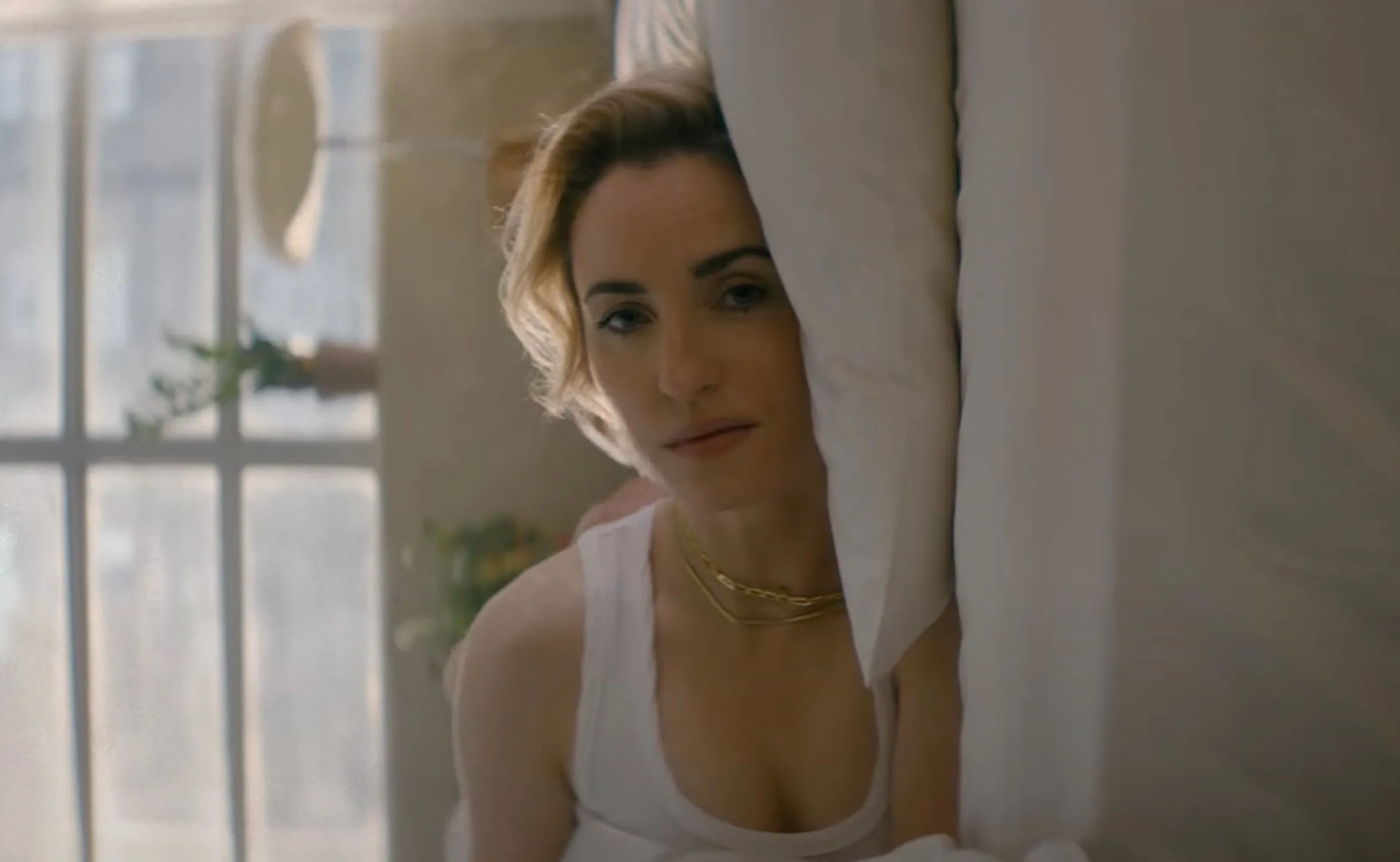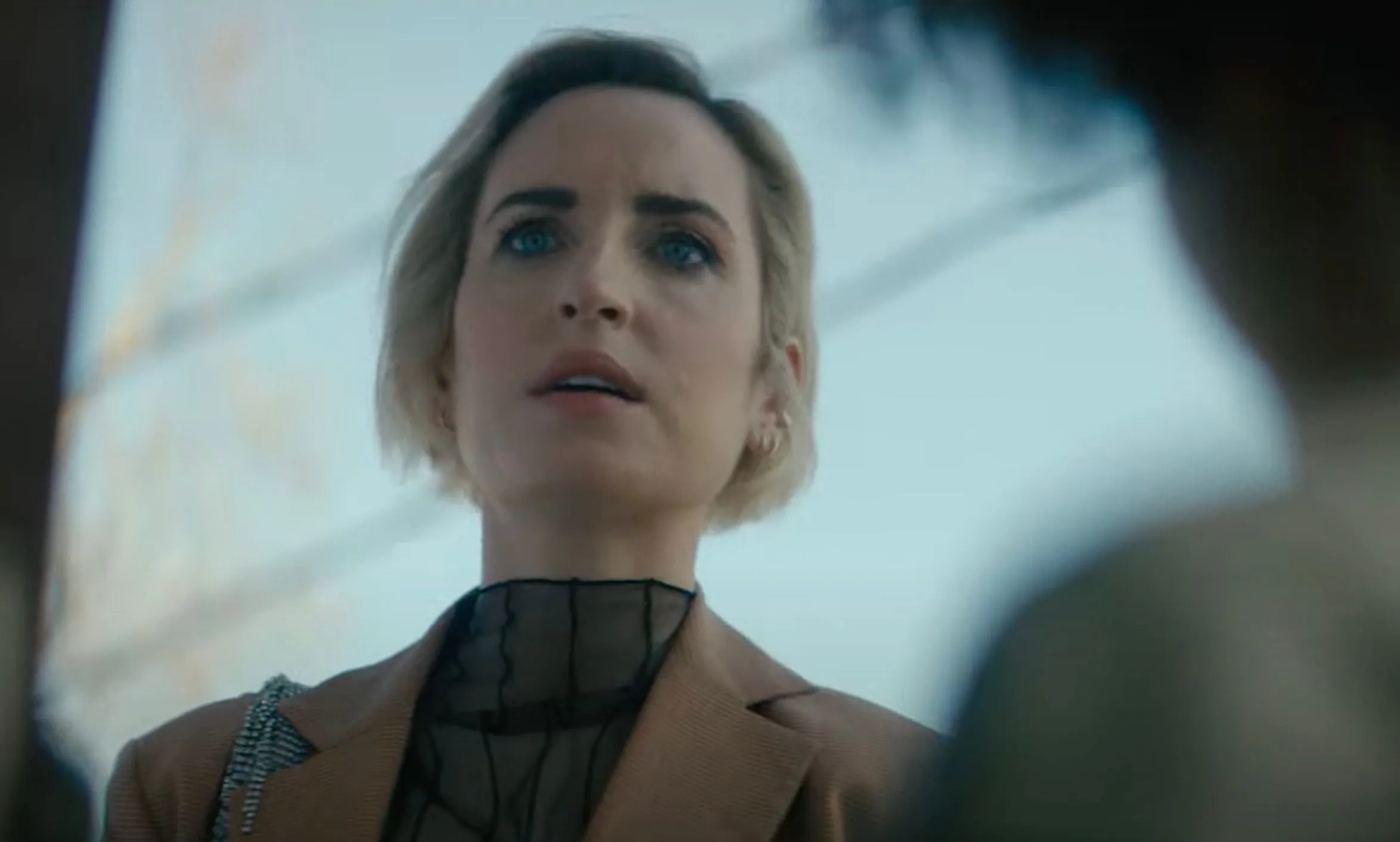Zoe Lister-Jones takes us on an imaginative journey through parallel worlds in her new series Slip. The show follows Mae, an art curator feeling trapped in a lackluster marriage. That is, until an intimate encounter leaves her waking up to discover her life utterly transformed.
From there, each new intimacy transports Mae to an alternative reality. We meet her as different versions of herself—a famous musician’s wife, a devoted mother, and more. Yet one constant remains: her friendship with Gina. Through it all, Gina stands by her side, even if unaware of Mae’s strange experiences.
What starts as a comedic premise becomes a deeper exploration. In each world, Mae forms new relationships that feel richly real. We see all the complexity of living as another self—new loves and challenges that sometimes mirror her old life’s issues. Most intriguing is Lister-Jones’ focus on the messy realities, avoiding simplistic portrayals.
Really, Slip is less about parallel worlds and more about parallel lives—the multiple paths our own choices could lead down. And through it all, Mae’s journey is one of self-reflection as she works to understand herself and what she truly wants from relationships. With Lister-Jones’ guidance, this series beautifully depicts how our connections shape our realities in often surprising ways.
Parallel Journeys
Creators take us to fascinating new worlds with each twist in Slip. By episode four, Mae’s travels grow increasingly surreal, but each journey offers insight.
Mae’s carefree night takes an odd turn waking beside Eric. In this life, she navigates fame and partying as his spouse. But addiction’s allure fades without fulfillment, leaving Mae longing for stability.
A chance meeting brings motherhood with partner Sandy. Their little girl brings joy, yet responsibility strains the new union. Seeing life from another’s eyes, Mae realizes what truly matters—even if this path isn’t hers to stay on.
Reeling from changes, Mae spirals, trying to convince best friend Gina of her plight. A humorous yet poignant moment sees her grasp for logic: “I think my pussy’s a wormhole!” Deeper, she craves anchoring ties that transcend circumstance.
Mae faces her strangest shift yet is surrounded by doors to other lives. A surreal crisis follows intimacy with another self. With compassion, her spiritual guide helps Mae accept life’s mysteries. Perhaps the solace lies not in answers but openly embracing each moment.
Zoe Lister-Jones’ Stellar Work
From Slip’s inception, Zoe Lister-Jones aimed high. Not only did she write a thought-provoking story, she challenged herself with Mae, a role demanding mastery of drama, comedy, and vulnerability. Listening scenes show Lister-Jones sank into this character, delivering emotional beats subtly yet powerfully.
Mae grapples with thorny dilemmas rarely granted nuanced small-screen treatment. Does stability necessarily equal fulfillment? Can relationships evolve past routine? Lister-Jones explores these weighty issues while cultivating Mae’s humor. She ensures laughs arise from recognizable flaws, not ridicule of others. Her timing and facial expressions capture Mae’s spiraling realizations in hysterical moments lightened only by empathy.
Beyond acting chops, Lister-Jones directed with care for her cast and vision. She nurtured authentic characters and chemistry, so audiences root for Mae’s happiness despite bizarre circumstances. Lister-Jones balances whimsy and deeper themes seamlessly—no mean feat. Her creativity spawns delightful visuals like the doors to possible lives or Sandy’s eclectic bar. Technical flair never overshadows character development, spotlighted by Lister-Jones’ direction.
Most impressively, Lister-Jones maintains focus on Mae’s journey inward. Through confusion and doubts, her performance charts a woman reclaiming herself. Lister-Jones makes clear Mae’s resilience and capacity for growth, whatever world she wakes in. By the series’ end, no character leaves more empowered or real than this multiverse traveler guided by Lister-Jones’ steady artistic hand. Slip’s success stems from this powerhouse talent for directing fully realized stories and characters only she could inhabit with such wit and wisdom.
Lives Lived in Full Color
Slip earns praise by delving deep into each relationship Mae explores. From married comfort to passionate chaos and beyond, no bond receives short shrift. Viewers learn what drew partners together alongside their everyday realities—trials as much as joys.
Take Mae’s lesbian partnership with Sandy. Their natural chemistry sparks, yet familiar dynamics wear too. Parenting tensions mount as days blend, reflecting all caring for kids know. Rather than gloss over imperfections, Slip highlights what sustains relationships: communicating, compromising, and weathering change together.
Colorful characters abound—from musician heartthrobs to business sharks. But Lister-Jones ensures each brings dimension, avoiding one-off tropes. Entertaining exchanges show souls connecting in small moments of understanding. Meanwhile, exploration of diverse identities feels genuine, sidestepping traps of making queerness solely definitional.
Mae’s bond to steadfast friend Gina proves an anchor, evolving to withstand dissonance between realities. Their bond conveys love’s power to transcend circumstance, prioritizing one another’s well-being over perceived slights. In a divided age, their portrayal of accepting people as whole beings—flaws and all—feels radically empathetic.
Overall Slip navigates intricate subjects with nuance and humor. Examining what sustains relationships long-term highlights our shared humanity. While whimsical premises could lean diversionary, meaningful characterizations keep viewers invested in lives lived full of feeling. By respecting complexity within partnerships, the series reminds us that understanding differs from agreement, and compassion costs not at all.
Perspectives Through Parallels
Just when you think you’ve seen every trick in the book, along comes a story that opens eyes in a whole new way. Slip toys with the multiverse in a manner most refreshing—each intimacy lands Mae in an alternate reality. Talk about an unconventional way to gain new perspectives!
It’s one thing to ponder life’s endless possibilities in the abstract. Quite another to watch them play out in living color. Through Mae’s experiences, we see in flesh what could have been with different career paths, relationships, and more. How intriguing to effectively “try on” other lives and learn from each choice’s consequences.
More than zany hijinks, this high concept unpacks profound insights. By slipping into parallels, Mae realizes the true constants in her world. Some bonds, like those with Gina, run like an unbroken thread through any reality. While other connections built on fleeting moments may surprise in their staying power once given the chance to develop.
Each new universe gifts fresh vantage points to see life, love, and herself with renewed clarity. Only by alternately losing and finding herself does Mae find her true north. The multitude of lenses proves much more illuminating than any single viewpoint alone could manage.
It’s a wild ride imagining alternate outcomes. Yet underneath the multi-colored craziness lies a thoughtful look at growth that only comes through new experiences. By trying paths not taken, we gain compassion for the myriad ways of being human. And recognition that within infinite possibility lies the greatest ability—to continually reinvent and become our best selves.
Perspectives on Perspective
Slip delves into some weighty subject matter beneath its surreal surface. Threads of self-discovery, identity, and the nature of happiness weave throughout Mae’s trips between realities.
One can’t help but see reflections of our own questioning in her journey. In each new world, Mae discovers another piece of the puzzle—that is herself. We watch her test definitions of what makes a family and reconsider preconceived notions of what brings fulfillment.
Her dissatisfaction with routine begs examining where we draw lines between love and mere comfort in long relationships. Meanwhile, the series holds up soulmate idealization and the pursuit of stability to scrutiny. Are some grass-is-greener views really selling us short?
Across shifting scenarios, we’re invited to look at familiar topics through alternate lenses. We start to see how perspectives on even core parts of life can vary dramatically from one choice or circumstance to the next.
This lends Slip’s examination of its subjects enviable depth and nuance. Nothing is painted in straightforward strokes. Mae’s upending of expectations keeps us as off-kilter as her, constantly reevaluating our own stances.
By the story’s end, we glimpse how private reinventions can arise from widened viewpoints. Overall, the series leaves us with plenty of fertile ground for reflection on happiness, identity, and what really shapes the longing in our hearts. A work that holds no answers but gives much thoughtful spin on life’s ever-changing scenery.
Moving Moments that Matter
Zoe Lister-Jones swings for the fences with Slip. And while its out-there premise might not land for all, her ambitions and thoughtfulness shine through. This is a show that aims to say something about what makes us human—our search for fulfillment, our endless capacity to change.
Mae’s journey across realities takes her through tangled relationship paths few have trod. In sharing such intimacy, both joyous and fractured, the show peels back layers on what really lasts between partners. Beyond surface charms, it probes our deepest needs and fears.
Not all moments grip with equal strength. But scattered throughout are moving scenes that stay with you. Quiet discussions that break open life’s bigger mysteries. Whether a daughter stands up to a bully or two lovers clash, Lister-Jones finds poetry in everyday struggles. She grants them clarity that feels truly seen.
For those willing to follow Mae’s explorations, Slip repays in spades. It spreads broad ideas about identity and connection with gentle touches. Sure, its wormhole wink might miss some marks. Yet Lister-Jones’ artful reflections on relationships and what really satisfies the longing soul deserve praise.
While not a show for all tastes, Slip leaves much to admire. For those seeking thoughtful looks at what it means to be human, Mae’s dimensional journeys will likely prove an innovative ride worth taking.
The Review
Slip
Innovative and thought-provoking, Slip takes bold leaps that bring nuanced insight into life's deepest questions. While its outré plot won't captivate all, Zoe Lister-Jones' empathetic character study and sharp dialogue draw viewers into Mae's exploration of self and partnership in a way that entertains and enlightens. Ambitious in scope yet tender at heart, this cerebral series deserves celebration for how it expands perspectives on familiar themes of identity, love, and meaning.
PROS
- Thoughtful examination of relationships, identity, and life's bigger questions
- Strong central performance by Zoe Lister-Jones
- Unique multiverse premise allows exploration of varied scenarios.
- Writing features nuanced characters and poignant dialogue.
- Ambitious creative scope tackles challenges of self-discovery
CONS
- Surreal plot device of dimensional "slipping" won't appeal to all
- Some may find episodic format does not fully pay off ideas.
- Comedic elements not equally landed for all viewers.
- Occasional scenes feel overreliant on sexual encounters.
- Left some wanting more Buddhistic depth over sex scenes.



















































Discussion about this post